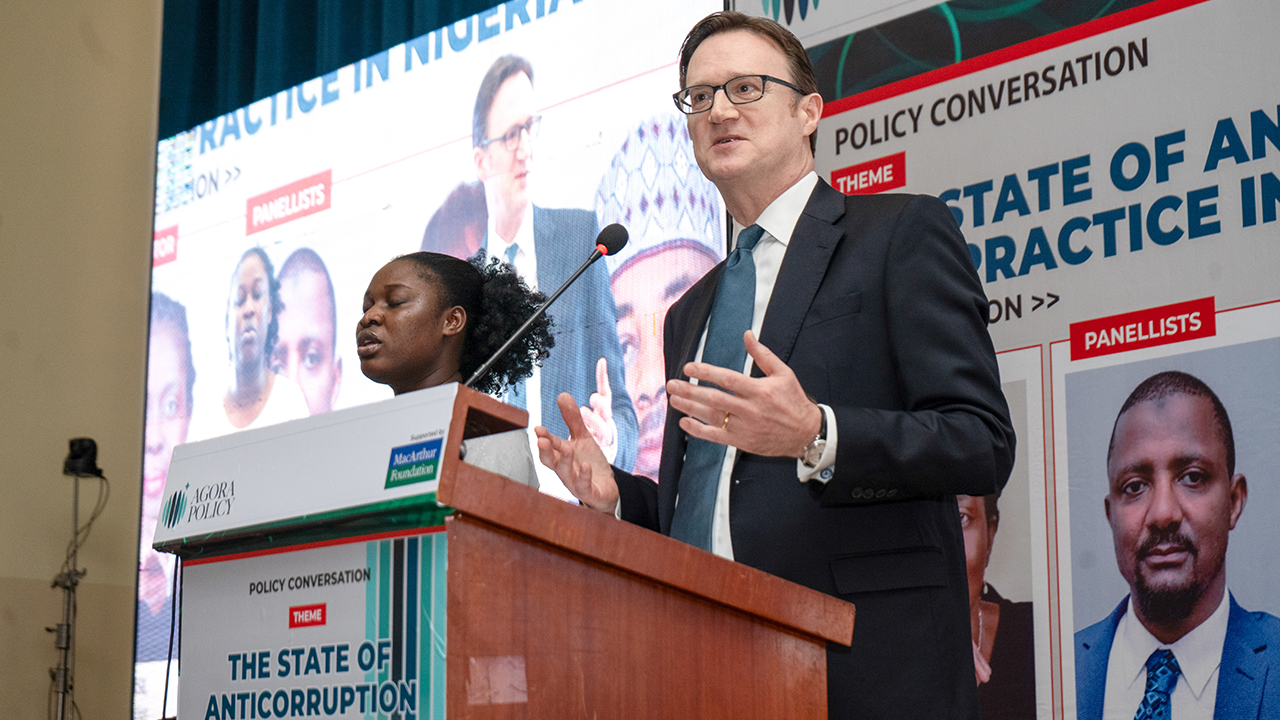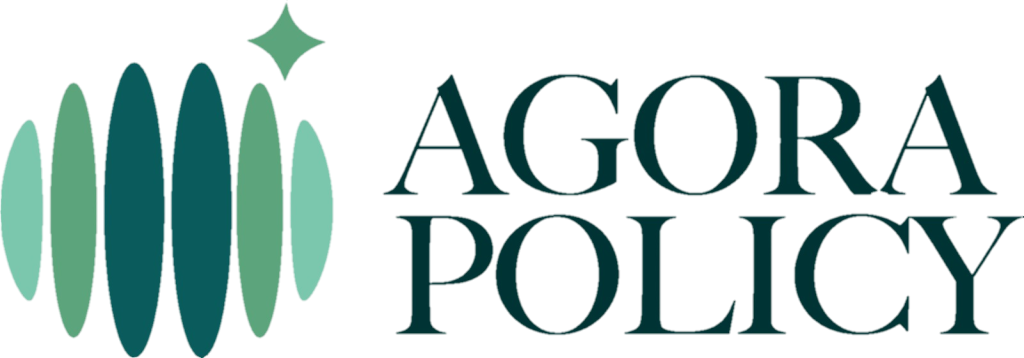Blog

- Details
- Blog
By Ayobami Ayorinde and Oluchi Nkeonye | Nigeria is set to rebase its Gross Domestic Product (GDP) and Consumer Price Index (CPI) a decade after it undertook a similar exercise.

- Details
- Blog
By Ola Olukoyede | I am pleased to have been invited to participate in this conversation on the state of the anti-corruption policy and practice in Nigeria.

- Details
- Blog
Thank you for the opportunity to say a few words today. Thank you to the MacArthur Foundation and to Agora Policy for organising this event. I have a growing admiration for Agora Policy. You’ve built an impressive range of thoughtful reports and memos in a short time. I’m an avid reader of your products.
Corruption is a sensitive issue, politically fraught. As a foreign diplomat, I have to be careful about what I say. As a guest in your country. I need to avoid making accusations which are disrespectful. I need, as some might say, to ‘stay in my lane’. I have, primarily, come to listen to Nigerian voices and leaders on anticorruption. But I can say things about the general picture, about what the UK has an interest in, and about the collaboration we have agreed with relevant Nigerian authorities.
There is plenty of international evidence about the damage that corruption—in its various forms— does to societies. It diverts public resources. It can perpetuate poverty. It raises the costs of doing business. It breeds distrust between government and the people. There are also plenty of examples of champions of reform, in Nigeria’s civil society and in government, who wish to tackle corruption. I salute them.
We have a history of collaboration in the fight against corruption with our Nigerian partners. Together, we have made significant efforts since the return of democracy in 1999 to build more effective anticorruption agencies: to detect, investigate and prosecute anticorruption and economic crime. The UK’s National Crime Agency has a productive working relationship with the EFCC since its creation under the leadership of Malam Nuhu Ribadu.
We also have a productive relationship with the Central Bank of Nigeria and the Nigerian Financial Intelligence Unit on illicit financial flows. We go after corrupt and illicit financial flows, and asset recovery, whenever they touch on UK jurisdiction and we have the evidence to act.
We have been working together on putting beneficial ownership registers in place, on which there have been real progress in Nigeria. We need to know who really controls any given company to enable better oversight by regulatory, and law enforcement, agencies. There is more to do on this issue, but Nigeria has the potential to be a leader across the African continent in this area.
We have supported, in our small way, Nigeria’s efforts to enact the global Extractive Industries Transparency Initiative (EITI). Over time, NEITI (the Nigerian chapter of EITI) has provided more information on licensing, revenue and expenditure across the extractive sector, especially the oil and gas sector. Though as Waziri Adio’s book, ‘The Arc of the Possible’, explains, there is still much to do. A continuing lack of transparency of the oil sector—its assets, its liabilities as well as its revenues – are a major break on attracting new investors. So again, progress made, but more is needed.
There are of course many challenges still to be dealt with, which are exacerbated by international financial complexity and the global nature of corruption today. Money moves across borders, rightly. But we accept, the UK is not blameless, at all. The UK consistently ranks in the top 15 countries in the Global Financial Secrecy Index. This implies a permissive environment for handling illicit funds that undermines the integrity of our financial markets. We need to do more to address vulnerabilities in both our financial systems—in the UK as well as in Nigeria—that facilitate such activity.
So, what can I say about the way ahead in UK efforts? First, when my Foreign Secretary (Rt. Hon. David Lammy) visited Nigeria in early November and met Nigeria’s Honourable Minister for Foreign Affairs (Ambassador Yusuf Tuggar), they signed a Strategic Partnership between our countries. They agreed that we should work more closely on countering illicit finance. They agreed we should collaborate more on detection, investigation, and prosecution, and do more to address vulnerabilities in local and global financial systems.
This means, second, we will continue to work and cooperate with a number of anti-corruption agencies, on capacity issues, on aligning standards, and in ensuring we can meet the standards required for mutual legal assistance. Third, that we will continue to support the Nigerian government and its agencies in improving financial intelligence and evidence collection which will enable us to bring grand corruption cases to court.
And fourth, and finally, My Foreign Secretary has just launched the process of developing a new UK anti-corruption strategy. This will seek to improve our efforts on anticorruption both domestically and with our international partners. He has, for example, committed to hosting a Summit of Financial Centres in 2025, which will look to drive joint action on this agenda across countries, and in which we hope Nigeria participates. I hope these comments reinforce the UK’s commitment to working with you all.
But real change can only come from within Nigeria: from Nigerian warriors, Nigerian leaders, and Nigerian institutions. We will help where we can, and where we are asked. But we are particularly keen to get behind people who have the courage to take on these issues in Nigeria. And we are keen to share the outcomes of the deliberation here with our central team working on the UK’s anticorruption strategy.
You have my best goodwill for today’s event.
*Dr. Montgomery, the British High Commissioner to Nigeria, gave this goodwill message at the policy conversation organised by Agora Policy, CDD and CFTPI on Tuesday, supported by MacArthur Foundation.

- Details
- Blog
By Adebayo Ahmed | For only the second time in US history, a president who lost re-election will return to the White House. Regardless of personal views on Donald J. Trump, he has made history and will return with a policy agenda likely to differ significantly from that of departing President Joe Biden.

- Details
- Blog
By Ayobami Ayorinde and Uchechukwu Eze | Earlier this week, the National Bureau of Statistics (NBS) published the latest data on Internally Generated Revenue (IGR) for the 36 states and the Federal Capital Territory (FCT). The data covered the period from 2019 to 2023. In this report, we highlight a few key points from the data and what it indicates about the fiscal health of the states.

- Details
- Blog
By Samuel Ajayi | After the recently-concluded United Nations General Assembly (UNGA), Nigeria’s Minister of Communications, Innovation, and Digital Economy, Dr Bosun Tijani released a report summarising his activities at the annual summit. The 18-page document references Artificial Intelligence (AI) over 25 times, reflecting the administration’s intention of using AI as a transformative tool for the country.
This aligns with Nigeria’s recently-unveiled draft National AI Strategy, which is open for public input. The draft strategy outlines the country’s vision for integrating AI to drive economic growth, enhance social inclusion, and promote technological innovation. Nigeria aims to become a key player in the global AI landscape. When this strategy is finalised and ratified, Nigeria will join the ranks of African countries with national AI strategies. These countries include Benin Republic, Egypt, Ghana, Mauritius, Rwanda, Senegal, and Tunisia. Mauritius holds the distinction of being the first African country with a national AI strategy which it unveiled in 2018.
Nigeria’s draft AI strategy, while ambitious in its vision and comprehensive in its scope, overlooks certain critical areas. In this article, we will be look at the key highlights of the draft strategy and point at areas in need of improvement.
A Vision of AI-Led Transformation
The draft document cannot be accused of lacking on ambition. It boldly envisions Nigeria "to be a global leader in harnessing the transformative power of AI through responsible, ethical, and inclusive innovation, fostering sustainable development through collaborative efforts." At its core, the strategy aims to leverage AI for national growth. It seeks to harness AI to address pressing challenges in key sectors like agriculture, healthcare, and education. These are areas where AI’s potential to drive efficiency and improve outcomes is immense. The draft strategy then identifies many of Nigeria’s strengths and proposes ways of taking advantage of them. It also highlights three objectives that are central to its goals: Economic Growth and Competitiveness; Social Development and Inclusion; Technological Advancement and Leadership.
The document sees AI as a transformative tool for Nigeria's economy, and identifies potentials for creating new industries and jobs, enhancing productivity, and attracting foreign investment. Another important aspect of the draft AI strategy is its emphasis on social good. It addresses societal issues like poverty, inequality, and access to essential services such as healthcare and education. It spends time detailing how AI can have a significant effect in these areas. Furthermore, the strategy aims to position Nigeria as a regional and global leader in AI. It proposes tangible steps to develop domestic AI expertise and establish ethical frameworks for AI development, recognising that AI leadership requires both technological competence and ethical considerations.
As a natural follow up to the identified objectives, the draft strategy lists five pillars that it hopes will transform Nigeria’s AI landscape for good. The five pillars are: Building Foundational AI Infrastructure; Building and Sustaining a World-class AI Ecosystem; Developing a Robust and Ethical Framework for AI; Preparing Nigeria for an AI Future; and Establishing a Clear and Consistent Governance Framework. The document then outlines the different plans under each pillar.
The first pillar focuses on building foundational AI infrastructure, recognising the need for robust data centres and high-performance computing resources. The second pillar aims to foster a vibrant AI ecosystem through initiatives like the AI Synergy Alliance and AI Centres of Excellence. The third pillar emphasizes the development of a robust and ethical framework for AI, and proposes a comprehensive AI ethics assessment framework. The fourth pillar addresses the long-term integration of AI into all sectors of society, emphasizing education reform and workforce development. The fifth and final pillar establishes a clear and consistent governance framework for responsible AI development, covering data privacy and risk mitigation.
It lays out an ethical framework that reflects a commitment to fairness, transparency, and human rights. It however tries to walk the tightrope between encouraging innovation while maintaining ethical responsibility for key actors. This rope is an increasingly tight one globally and only after a while can the results of current regulations become apparent. But it is noteworthy that this is a major concern in the draft strategy.
The document never fails to mention Nigeria’s youthful population. The draft strategy rightly identifies the potential demographic dividend and a major opportunity to build a tech-savvy workforce that could transform Nigeria into a leading AI hub. In the section on identifying Nigeria’s relative strengths and weaknesses, the document quickly points out that about 70% of Nigeria’s population is under the age of 30. Already, the Federal Ministry of Communication, innovation, and Digital Economy (FmCiDe) launched 3MTT in the third quarter of last year to create two million digital jobs by 2025 targeted at this demographic group.
The document also clearly recognises the challenges and obstacles that may hamper the full implementation of the strategy itself and spends considerable time discussing some of these challenges and how to mitigate the challenges. However, there are some challenges that require a second look before the document is finalised.
Talent Drain: A Crisis in the Making
Over the past decade, Nigeria has been losing its brightest tech talents to countries with better job opportunities, higher wages, and more stable environments. Tech Nation, a global talent programme that allows technology talents to emigrate to the UK, listed Nigerians as the third highest beneficiaries of the scheme behind India and the USA. Other developed countries have taken different routes to attract talents from developing countries and talented Nigerians are taking the opportunity. While the strategy briefly mentions this challenge, it offers no concrete plan to stem the flow of skilled professionals from the country. The strategy has a lot more for how it may get people in the diaspora to contribute, including through a special “Nigerian AI Talent Transfer Programme” which would offer incentives for diaspora AI researchers. But retaining local talent is as important as reaching out to diaspora talent.
This is a glaring oversight. Nigeria cannot become a global AI leader if its top talents continue to emigrate. To reverse this trend, the government must do more than offer vague promises.
The Infrastructure Problem
The more critical part of the success of the AI strategy remains infrastructure. No matter how grand the vision, without the infrastructure to support it, the strategy risks crumbling under its own weight. Nigeria’s current digital infrastructure is simply not equipped to handle the demands of large-scale AI development. Ranked 132nd globally, Nigeria’s internet speed is not fast enough for the country’s AI ambition. Also, access to High-Performance Computing (HPC), critical for AI research and applications, remains sparse.
The strategy acknowledges these gaps, but the solutions offered are vague and lack urgency. Talk of establishing HPC centres and clean energy-powered AI clusters sounds promising on paper, but there are no clear timelines, funding mechanisms, or partnerships identified to take these projects beyond mere wishes. In contrast, Rwanda’s AI strategy outlines specific measures to address these challenges, including a review of ICT procurement guidelines, detailed plans for land acquisition, and feasibility studies. This level of detail contrasts sharply with the broad approach in Nigeria’s draft strategy.
The infrastructure challenge requires more specifics and a clearer roadmap. It must be acknowledged the that the Minister of Communication, Innovation, and Digital Economy received a Federal Executive Council approval in May for an SPV to facilitate the delivery of over 90,000km of fibre optic cable to increase Nigeria’s internet penetration. If Nigeria truly wants to compete on the global stage in AI, investments in infrastructure such as this must be clearly stated and laid out.
A Path Forward
A National AI Strategy is a crucial step in the right direction for Nigeria. The vision in the draft document is ambitious, and its goals are aligned with global trends. But if Nigeria is to become a player in the AI space, it needs to address its infrastructure shortcomings head-on. And this will include not just AI-specific infrastructure. For example, HPCs require power in abundant quantity and even some developed countries are beginning to take notice. Nigeria currently struggles with power supply for basic household and industrial needs. This will no doubt have a massive effect on the country’s AI ambitions. In a recent report on the state of Compute access, the Tony Blair Institute for Global Change noted the challenge of power as a major obstacle toward achieving this. Bridging this gap will more imagination and more funding. A recent statement from Nigeria’s Ministry of Power says that the power sector requires a yearly investment of 10bn dollars over the next ten years. This puts a severe limit on Nigeria's AI ambitions as outlined in the draft strategy.
The focus of the strategy on youth is the right one. We must press our advantage on this part and deliberately push the limits within our current realities. The focus must be on driving innovation within our unique mobile-first innovation context. This will involve looking at programmes that encourage model deployment on less demanding computing environments like laptops or mobile phones. The talent challenge is a serious one and we must look at getting ahead of the challenge. We can take a leaf from the recently released health worker migration policy by the Ministry of Health. We must find creative ways not just to retain but add value to the talents while ensuring that Nigeria benefits from the innovation. We can also borrow a leaf from the Egyptian approach of offering specialised scholarships that allow local talent to learn abroad with a promise of coming back. This bonded approach adds value both to the talents and to the country.
Overall, Nigeria’s draft AI Strategy is full of promise and seems to hit the right notes. But the draft strategy needs more thought on how to address the two challenges of infrastructure deficit and talent retention. These are not fatal defects, as they can be corrected in the final draft of the strategy. The ultimate test, however, will be implementation. No matter how sound a strategy is, what makes the difference is competent, disciplined and sustained implementation.

- Details
- Blog
By Ayobami Ayorinde, Uchechukwu Eze, Oluchi Nkeonye, and Seyi Akinbodewa | On 24th September 2024, the National Bureau of Statistics (NBS) released two reports on the state of the labour force in Nigeria.
The reports, titled the Nigeria Labour Force Survey and produced in partnership with the World Bank and the International Labour Organisation (ILO), covered the whole of 2023 and the first quarter of 2024. The increase in unemployment from 5% in the third quarter of 2023 to 5.3% in the first quarter of 2024 has dominated the headlines.

- Details
- Blog
By Ayobami Ayorinde and Uchechukwu Eze | The July 2024 inflation data released yesterday by the National Bureau of Statistics (NBS) showed that Nigeria’s key inflation figures fell for the first time in 19 months.

- Details
- Blog
By Samuel Ajayi | Last week’s policy conversation on “Enthroning Accountability in Local Governance in Nigeria” attracted a diverse audience of more than 200 participants and threw up numerous ideas on how to deepen accountability and good governance in Nigeria’s third tier of government.


